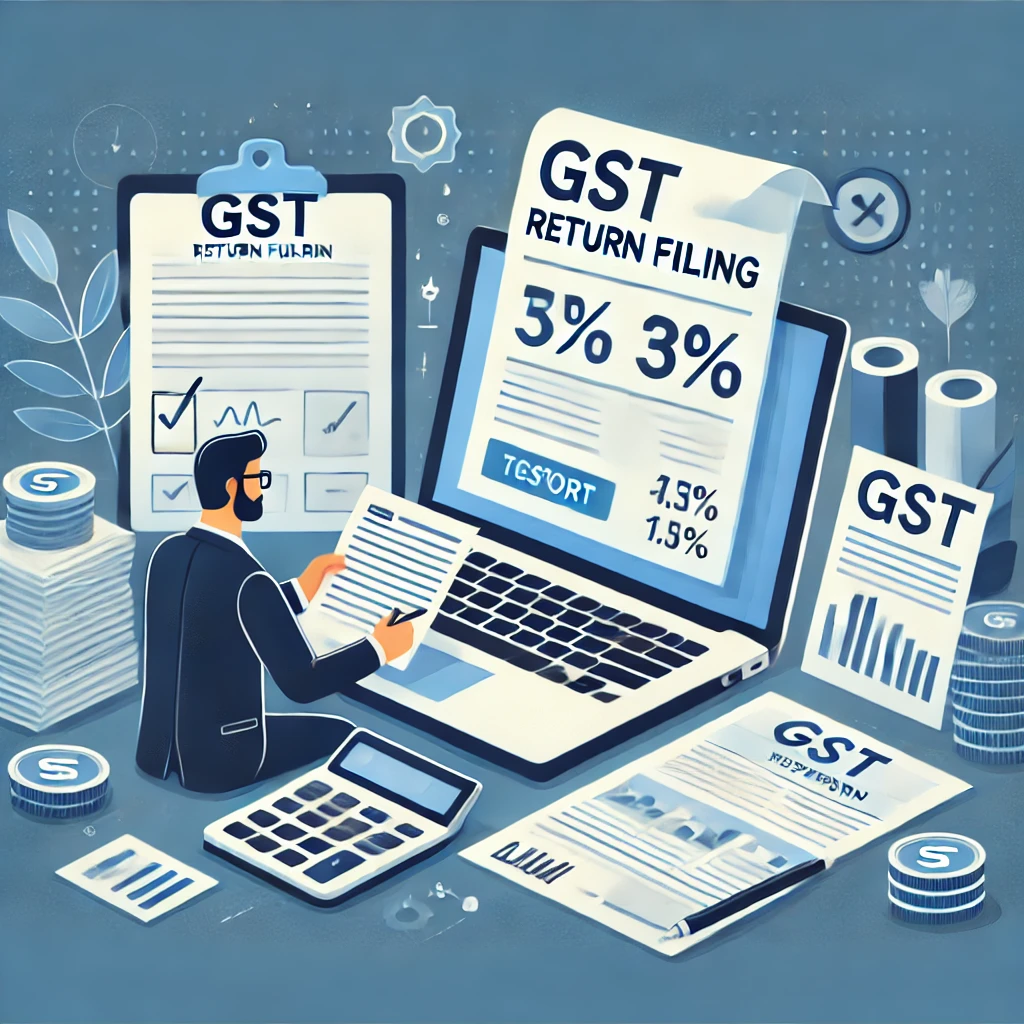Start Business
Start Business
Registration & License
Registration & License
Trademark Filing
Trademark Filing
Goods & Service Tax
Goods & Service Tax
Income Tax
Income Tax
MCA Services
Tender Registration
Tender Registration
Others
GST Return Filing Services | File Your GST Returns Online Today
Best & Reasonable Plans
Smart solutions,fair prices - your success starts with the Innovative solutions, competitive pricing – your journey to success begins with the perfect balance for growth!

OVERVIEW
GSTR-9 is an annual return that consolidates all the monthly or quarterly GST returns filed during the financial year. It provides a comprehensive summary of your business’s sales, purchases, input tax credit (ITC) claims, and tax payments. Filing GSTR-9 is mandatory for regular taxpayers and ensures compliance with GST laws. It also serves as a crucial document for audits, helping businesses maintain transparency and accuracy in their financial reporting. Timely and accurate filing of GSTR-9 avoids penalties and strengthens your business’s credibility with tax authorities.
Key Features of Filing GSTR-9
- • Complete Financial Overview : GSTR-9 provides a consolidated view of your business’s GST transactions for the entire year, making it easier to analyze financial performance and ensure accuracy.
- • Reconciliation and Error Detection : It helps reconcile data between GSTR-1, GSTR-3B, and your books of accounts, identifying discrepancies and ensuring correct ITC claims.
- • Audit Readiness and Compliance : Filing GSTR-9 ensures your business is prepared for audits and remains compliant with GST laws, reducing the risk of penalties or legal issues.
Why Hire a Certified Accountant for GST Return Filing?
GST registration is mandatory for businesses and individuals whose aggregate turnover exceeds the prescribed threshold limits, which are ₹40 lakhs for goods (₹20 lakhs for special category states) and ₹20 lakhs for services (₹10 lakhs for special category states). Additionally, certain businesses must register under GST regardless of turnover, such as e-commerce sellers, inter-state suppliers, and businesses involved in export or import of goods and services. Casual taxable persons, non-resident taxable persons, and businesses opting for the composition scheme also need to register. Even if your turnover is below the threshold, voluntary registration is beneficial for claiming input tax credit (ITC) and enhancing business credibility. Failing to register when required can lead to penalties, making it essential to understand whether your business falls under the mandatory GST registration criteria.
Common Mistakes to Avoid in GST Return Filing
Incorrect or Incomplete Data Entry
One of the most common mistakes is entering incorrect or incomplete details in GST returns, such as wrong invoice numbers, mismatched tax amounts, or missing supplier information. These errors can lead to mismatches in GSTR-2A and GSTR-3B, resulting in denied input tax credit (ITC) claims or penalties. Always double-check data before submission.
Missing Filing Deadlines
Late filing of GST returns attracts penalties, interest charges, and can even lead to the cancellation of your GST registration. Many businesses fail to file returns on time due to poor record-keeping or lack of awareness about due dates. Setting reminders or hiring a professional can help avoid this issue.
Neglecting Reconciliation
Failing to reconcile purchase records (GSTR-2A) with books of accounts is a critical mistake. Discrepancies between claimed ITC and actual purchases can trigger audits or notices from tax authorities. Regular reconciliation ensures accurate ITC claims and compliance.
Silent Features
Auto-Populated Returns
QRMP Scheme
Nil Return Facility
Offline Tools
Real-Time Error Detection
SMS/Email Alerts
Advantages of GST Return Filing
- Improved Cash Flow Management : Timely GST return filing ensures accurate input tax credit (ITC) claims, which can be used to offset tax liabilities, improving cash flow for businesses.
- Enhanced Business Reputation : Regular and accurate GST filing builds trust with customers, suppliers, and authorities, enhancing your business’s credibility and reputation.
- Access to Government Tenders : Many government tenders require businesses to have a consistent GST filing record, making compliance a gateway to new opportunities.
- Simplified Audits and Inspections : Accurate GST returns and proper documentation make audits and inspections smoother, reducing the risk of penalties or disputes with tax authorities.
- Real-Time Compliance Monitoring : The GST portal allows businesses to track their compliance status in real-time, helping them stay updated on filing deadlines and pending actions.
- Better Financial Planning : Regular GST filing provides insights into your business’s financial health, enabling better tax planning and decision-making.
Documents Required
Sales Invoices
Purchase Invoices
Bank Statements
Expense Records
Previous GST Returns
E-Way Bills (if applicable)
Step-by-Step Guide For GST Return Filing
Here are 5 steps to complete your GST Return Filing
Step 1
Gather Required Documents
Step 2
Reconcile Data
Step 3
Prepare Returns
Step 4
Verify and Submit
Step 5
Pay Taxes and File Challan
Empowering Your Business to Stay Ahead


Ensuring excellence in every aspect of business operations

Helping businesses to stay ahead of the competition effectively

Providing expert guidance for long-term business growth





